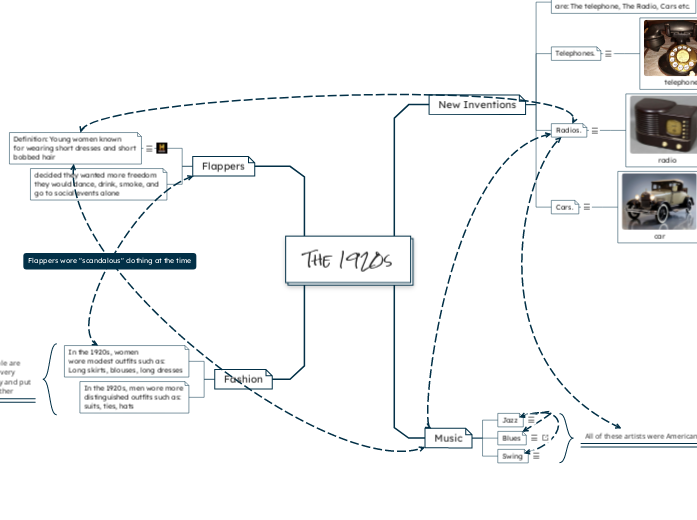da Kara Maddigan mancano 5 mesi
66
The 1920s
The 1920s saw the rise of Jazz and Swing music, which captivated audiences both in America and internationally. Despite being banned from public venues and labeled as "black music,"

da Kara Maddigan mancano 5 mesi
66

Più simili a questo
Flappers wanted to rebel against gender norms and make a name for themselves. they would wear knee length dresses, cut their hair into short bobs, drink, attend social events alone, wore boyish clothes, they wore PANTS! women really wanted to get out of the chains of misogyny and become their own person.
Flappers would commonly dance to Jazz, Swing. they sung Blues music. They did things that were deemed "unladylike". On of the most famous Flapper was Clara Bow, she was most known for her "talkie" movies. she was the "It Girl" of the decade
Pruitt, Sarah. HISTORY-How Flappers of the Roaring Twenties Redefined Womanhood. Last modified September 17, 2018. https://www.history.com/news/flappers-roaring-20s-women-empowerment.
Hollywood Walk of Fame-Clara Bow. Accessed November 18, 2024. https://walkoffame.com/clara-bow/#:~:text=Clara%20Gordon%20Bow%20was%20an,as%20the%20%E2%80%9CIt%20Girl%E2%80%9D.
Swing music was a type of Jazz. it was smooth and easy to dance and listen too. This also ties in with the swing clubs as well.
Benny Goodman was considered the King of Swing, he had quite the reputation of producing excellent music. although he was american, canadians still heard his music. much like nowadays.
Blues was the first most popular type of music before jazz. it became so popular because of the rise in radios and radio broadcasting.
The most popular artists of the 1920s blues era were Ma Rainey, Bessie Smith, Alberta Hunter, and Ethel Walters. they were the Mothers of Blues, Queens of the Radio. Their music was constantly playing, making them very famous
Black Women in Blues. https://libguides.wustl.edu/c.php?g=853438&p=6110024#:~:text=Bessie%20Smith%20was%20born%20in,with%20hits%20like%20'Downhearted%20Blues
Jazz, known as "Swing", was very popular in the 1920s. it was listened to worldwide. most clubs even exclusively played jazz.
there were underground "swing clubs", very popular for many reasons. jazz music was prohibited from public dance venues and considered "black music". although this music was banned, both black and white people would mix in secret dance clubs.
the very first car was made in 1857. and they have soon branched off into so many new and improved companies and versions. the 1920s was the big boom of innovation for the cars, new models and new types.
in Oshawa, Robert Samuel McLaughlin, another Canadian pioneer in the industry, converted his family's thriving carriage and sleigh production to the new horseless carriage with its noisy engine. In 1908 McLaughlin arranged with William C. Durant, to use American inventor David Buick's engines. Buick engines with McLaughlin bodies gained world recognition. Later, Durant offered McLaughlin the Canadian rights to the Chevrolet "Classic Six" (a five-passenger touring car designed by race car driver Louis Chevrolet). General Motors Canada branch was formed in 1918.
Dykes, James G. , and Dimitry Anastakis. "Automotive Industry." The Canadian Encyclopedia. Historica Canada. Article published February 06, 2006; Last Edited May 21, 2021.
there were radios before the 1920s, but you needed headphones to listen to whatever was being broadcasted. meaning only one person at a time was able to listen.
The main stations would play: Symphonies, Jazz, Children's Tales, grain price reports, and even health facts!
by the 1930s, CBC itself even started showcasing american broadcasts in the evening hours.
Rutherford, Paul. "Radio Programming." The Canadian Encyclopedia. Historica Canada. Article published December 03, 2012; Last Edited March 04, 2015.
before the 1920s, the Telephone was not very popular, after WW1 ended, innovation began and inventions were spewing out. one of these inventions was the Telephone.
between 1906 and 1920s was the most popular years for the telephone. the Telegraph and Telephone are connected in some ways, both are digital messages being sent long distances. though a Telephone- from the greek word "μακρινή φωνή" meaning "distant voice"- was originally made in 1876 by Alexander Graham with a goal of communicating across long distances quick and reliably.
Babe, Robert E.. "Telephones." The Canadian Encyclopedia. Historica Canada. Article published December 03, 2012; Last Edited July 13, 2015.